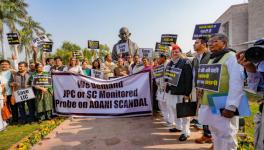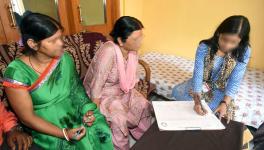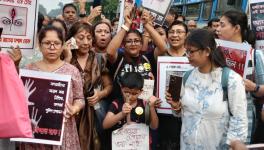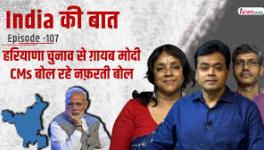Budget 2024-25: Modi Build-up Goes High Pitch as Allies Wait & Watch
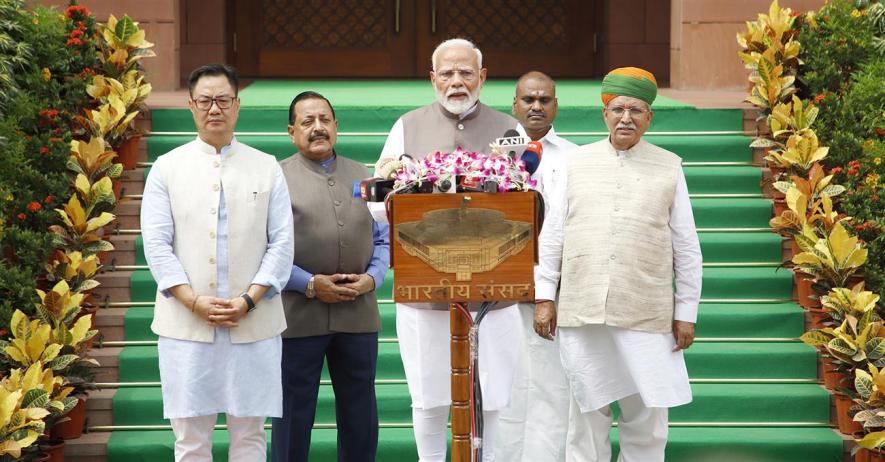
Image credit: Press Information Bureau
‘Samgachhadhvam, samvadadhvam…Let’s move together, let us speak in unison, let us meet in harmony and so our speech….’. This celebrated Rig Veda verse prominently figures inside the dome of the Central Hall of the now abandoned Parliament House.
Unfortunately for Indian democracy, during the very first session of the 18th Lok Sabha, Prime Minister Narendra Modi has negated both the sane Vedic counsel as well as the valuable tenets of parliamentary democracy. This has been the grim message from last month’s events like the Parliament session, NITI Aayog’s annual meeting and such other developments.
After the elections, optimists had hoped that Modi would now reconcile himself to the compulsions of coalition and work within the norms and traditions of parliamentary democracy. What has been happening in the past two months is really scary.
All democratic conventions and ethics followed over the decades are being nonchalantly subverted or violated to serve the main ruling party’s partisan interests. Procedural niceties, objectivity and neutrality are being given a go-by. Consider the absence of fair play and equanimity in the disbursal of budget allocations.
This time, the Union budget has singled out Bihar led by Nitish Kumar and Andhra Pradesh, led by Chandrababu Naidu — on whose 28 MPs the National Democratic Alliance (NDA) government survives — for bulk of the budget allocations. There was no show of equanimity. No government in the past ever had shown such audacious display of arrogance. The two states were bestowed a massive bonanza.
This includes Rs. 15,000 crore for Naidu’s dream project, Amaravati, Rs. 26,000 crore for four road projects and Rs. 21,400 crore or a power plant. Naidu is the biggest ally of the ruling Bharatiya Janata party (BJP), with 16 MPs. From day one, he has been insisting that his support to Modi wholly depended on the budgetary allocations for his dream projects, like Amrawati. The bargaining was so hard that he had to visit Delhi thrice. And Modi, with all his ‘strong leader’ aura, meekly yielded.
The ‘support price’ — a term coined by Samajwadi Party leader Akhilesh Yadav — for Nitish Kumar’s 12 MPs in Bihar has been even more impressive at Rs 58,900 crore. This includes road projects worth Rs.26,000 crore, a 2,100 MW power plant worth Rs 21,400 crore and flood management projects worth Rs 11,5000 crore.
Nitish Kumar also wrested two expressways in Bihar — Purnea-Patna and Buxar-Bhagalpur. The Centre will also support development of Bodhgaya, Rajgir, Vaishali and Darbhanga. Another scheme Nitish Kumar insisted and got funds for was the accelerated irrigation benefit programme. This is what a Janata Dal (United) leader meant during the Lok Sabha debate when he said the new NDA alliance was held by
As for Nitish Kumar, the ‘Sushashan Babu’ (good governance man) has a dismal track record in utilisation of allocated funds. Many doubt his ability to absorb such huge Central funds effectively. During the last financial year, Bihar could spend only 77.95% of the total. It surrendered an amount of Rs. 20,526 crore.
It is not that Andhra Pradesh and Bihar don’t deserve special Central funds. With unsustainable accumulated public debt burden, both needed central support. But it should be allocated on the basis of a set of accepted criteria. Not piecemeal and at the whim of the ruling party. Disbursement of Central resources must not be discriminatory. The Finance Commissions were set up with these very concerns.
In the good old days of planning, special studies were conducted and guidelines drawn up on the basis of the socio-economic condition of the states. One of the first actions of Modi as Prime Minister was to dissolve the Planning Commission. The new regime always disliked guidelines or any restrictive constraints, that some economists say, would inhibit his conglomerates-based growth strategy.
The ‘funds-for-support’ policy of Modi and Amit Shah (Union Home Minister) or what their rivals call the ‘kursi bachão’ (save the chair) budget, marks an era of blatant politicisation of budgetary allocations.
It raises many uncomfortable questions. By singling out two allies as beneficiaries, the Union budget signals that hereafter Central resources can be disbursed on the basis of whims and caprices of those in power, not on any well-defined, equitable criteria.
By doing so, the budget has penalised the people of states that elected non-NDA parties. The Opposition’s resentment was expressed by Congress president Mallikarjun Kharge who said rather figuratively: “Nobody got anything…Everyone’s plate is empty except those two who have got pakoras and jalebi. I have never seen such a budget. They only want to cling to power”.
Protests by the Opposition have been instant. Outside the Makar Dwar in Parliament, Opposition MPs belonging to Trinamool Congress, Dravida Munnetra Kazhgam, SP, Rashtriya Janata Dal, Siva Sena (UBT) and Left parties stood with placards saying ‘Treat Us All Equally’.
In the House, Opposition MPs condemned the discrimination of the states ruled by them.
In states, there were sporadic protests, including impromptu processions, against the way benefits were bestowed on just two states at the cost of others. West Bengal Chief Minister Mamata Banerjee termed the budget “politically biased and only for helping friends.”
Jharkhand Chief Minister Hemant Soren said the budget neglected all excepted the BJP’s favoured allies. Tamil Nadu Chief Minister M K Stalin said PM Modi was avenging those who had defeated him in the recent Lok Sabha elections. The state’s sports minister Udhayanidhi Stalin said his state got only Rs 20 crore for Khelo India whereas Uttar Pradesh and Gujarat got Rs. 400 crore.
Telangana Chief Minister Revanth Reddy, former Maharashtra CM Uddhav Thackeray, Kerala CM Pinarayi Vijayan, Aaam Aadmi Party’s Delhi minister Atishi and former Odisha CM and Biju Janata Dal leader Naveen Patnaik came out with statements demanding equitable and rules-based allocations.
There were some jarring voices from BJP leaders, too. This, as well as the public opinion building up against the Centre’s discriminatory funding, has led to panic in Delhi. At one stage, it looked as though things were going out of control, which forced the BJP bosses to launch a big damage control operation.
BJP president JP Nadda and his aides called all BJP chief ministers and senior state leader to warn them against making any statements about the Centre’s neglect. They were told to issue statements denying their states were starved of Central funds and had not experienced any kind of discrimination.
But, the worst happened at the annual meeting of the NITI Aayog on July 27. Ten Opposition parties had boycotted the meeting in protest against “politicisation” of the Budget. They felt no purpose would be served by attending the meeting of a body that has no financial powers like the good old Planning Commission.
Mamata Bannerjee was the lone opposition CM who attended the meeting but her microphone was switched a few minutes after she began speaking. She protested against “muffling” the lone Opposition CM’s voice.
The political discrimination at the NITI Aayog meeting was similar to the whimsical treatment meted out to the Opposition in the budget, Banerjee said, adding that while she was stopped after speaking for five minutes, Chandrababu Naidu was allowed to speak for 20 minutes and chief ministers of Assam, Goa and Chhattisgarh got 10 to 12 minutes. “What is the criteria for allotting time? This is sheer discrimination,” she said.
Mamata said.
The West Bengal CM said the Centre had stopped all welfare projects of the state and had deprived it of its rightful share in Awas Yojana and roads scheme.
Asking for disbanding the ‘formless’ NITI Aayog, Banerjee questioned the logic of disbanding the Planning Commission. For the sake of a fair fact-based distribution of available national resources, it should be revived, she said, adding that she herself had attended Planning Commission’s meetings. She got prompt support from Opposition leaders, including.Stalin and Akhilesh Yadav.
The culture of discrimination has spread to Parliament. The previous day, the Rajya Sabha chairman declined permission to members to raise issues in the House under Rule 267. Tempers ran high when the chair allowed a BJP member to raise issue of corruption against a Karnataka corporation under the same rule. Senior member P. Chidambaram also rose to refer to this incongruity in the Chair’s ruling.
By no means, Modi’s fall from the high pedestal has not dampened his ‘strong leader’ dreams and Hindutva aspirations. Even as a coalition PM, he has been strenuously pushing these two objectives.
- Continuing with the Hindutva agenda, the Modi regime has appointed hard-core Rashtriya Swayamsevak Sangh (RSS) and BJP leaders as new governors to nine states. Included in the list is Modi’s most trusted IAS cadre Kailashnathan.
- In another pro-Hindutva gesture, the Centre lifted the decades old ban on government employees joining the RSS.
- As part of his ‘strong leader’ push, Modi must address every available function. After presiding over the NITI Aayog meeting, he first addressed the BJP chief ministers meeting and then Delhi BJP leaders as also the Manipur CM — for the first time after the strife began in the Northeastern state 18 months ago.
- The Modi build-up by BJP CMs is turning really trivial. His photo prominently figured in a state government advertisement on the inclusion of Assam’s Moidams of Charaideo in UNESCO’s world heritage. Modi has no link with this Ahom heritage site.
- Modi also figures prominently in MP government’s half-page advertisement for the appointment of anesthesiologists offering ‘attractive package’.
- When the Haryana government issued a full-page advertisement announcing ‘happy card’ for free bus travel, it also had a Modi picture. The list goes on.
The writer is a veteran journalist. The views are personal.
Get the latest reports & analysis with people's perspective on Protests, movements & deep analytical videos, discussions of the current affairs in your Telegram app. Subscribe to NewsClick's Telegram channel & get Real-Time updates on stories, as they get published on our website.












